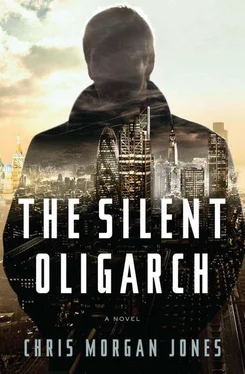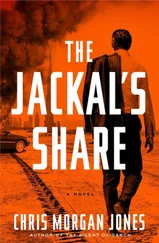As he walked through the gate he saw Elsa crouching down by Daniel, who was in tears, Elsa holding a handkerchief to his nose.
“There you are,” said Elsa. “Can you take over? Nancy wants me to push her.” She stood up with Daniel’s hand in hers. “What’s wrong? You look white.”
“I’m sorry, I… Christ, I…”
“What is it?” She looked at him, worried.
“The man I went to Berlin to see…” He hesitated, not knowing how to say it.
“The one who wouldn’t talk?”
Webster nodded. “He’s dead. That was his partner. He wanted to tell me.”
“Jesus. How?”
“He didn’t say.”
“Come here.” She took his hand and pulled him to her; he rested his head against hers for a moment. Daniel gave a little whimpering noise. “That’s quite a shock. Look, let’s go home. You need a cup of tea.”
He pulled back a little and looked at her. “Thanks, baby, but… I should see Ike. He was saying that it’s my fault.”
“Ike?”
“No, Christ no. The call. I’m sorry. It’s just… He seemed to think that if I hadn’t been to see him he’d still be alive.”
“Daniel, shush—just a minute. But that’s nonsense. You don’t even know how he died.”
“I don’t. I don’t know. I need to see Ike. I’m sorry. I… Can you manage here?”
“Of course. Why don’t we drive?”
“It’s OK. I think I’ll walk. Will you be OK?”
She took his hand again. “What if he’s not there?”
“He’ll be there.”
“All right. Be careful. And don’t walk under a truck, for God’s sake.” She looked at him, gripped his hand and then let go.
IT TAKES HALF AN HOUR, more or less, to walk from Primrose Hill to Well Walk in Hampstead. For all his urgent need to understand what had happened, Webster walked slowly, and it took him forty minutes. He wanted to recover himself before he got to Hammer’s house, and to make some calls. First, as he walked along, he used his phone to search the Internet for any reporting of Gerstman’s death. Nothing. He thought the newswires might have had it by now. Then he called Istvan in Budapest, and asked him to find out what he could from his former colleagues in the police. He called people in Germany to see whether news had reached there. Then he searched his mind for others to phone, as if by casting as many lines as possible he could improve the chances of discovering that he wasn’t to blame. But there was no one else. He would simply have to wait.
Prock’s theory wasn’t logical, of course. If Gerstman had actually revealed something, if their meeting had been clandestine, if it had been significant in any way, then perhaps it would have made sense. Gerstman must have known things—after all, that was why Webster had wanted to talk to him—but enough to make him dangerous? It seemed so unlikely. This rising anxiety wasn’t logical either, but rise it did. He imagined Gerstman being tailed by sinister men in silhouette and then shot, strangled, poisoned, his tanned skin growing pale and rigid. How slow he had been, how stupid not to realize that violence was lurking so close. That, of course, is what Inessa’s article should have told him. It was a sign that he had almost willfully ignored.
Slowly he climbed toward Hampstead through ever older, ever greener streets, the world around him still vivid in the coming dusk, the colors richer in the half dark. In the absence of facts, ideas and images churned inside him. Inessa pulled from her hotel room by uniformed men, Gerstman dragged from his by dark, shapeless forms. They fit together, these stories; they were of a piece.
HAMMER’S HOUSE SEEMED to glow beside its neighbors. It was a brick building of four stories, not counting the attic floor where his housekeeper lived; three centuries old, narrow, its bright mortar and clean red bricks gave it an almost colonial look. Most of its windows were Georgian sashes but a large wooden oriel, painted white with three pointed ogee windows, hung over the street from the second floor. The place was much too big for Hammer, thought Webster, who coveted its position and its splendidly entitled views across London to the City. Down in the lowlands of Kensal Green this would be seen as grandeur indeed. He had often wondered whether the whole house was used; he suspected that room after room simply stored old newspapers and books of military campaigns. Did Hammer entertain? Did he have house guests? Surely not.
Webster gave a brisk rap on the knocker. Hammer answered the door. This was strange because Mary, his housekeeper, usually had Mondays off. Webster, noticing this, wondered irritably what it would take for his habit of trivial observation to switch off.
“Ben. Come in.” Hammer betrayed the faintest surprise, the merest crease of a frown. Webster was grateful for the plain greeting. He didn’t need to be told that he looked terrible or asked what was the matter. Hammer was wearing a thick cardigan of muddy beige with a shawl collar, his glasses propped on his forehead. He led Webster into his study. Either side of the fireplace was an armchair, and by the farthest one, on a low table by a cheap spotlight, lay a thick hardback, open and facedown. Books lined the walls on old oak shelves and occupied much of the floor in ambitious columns. In between them sat lower piles of newspapers, journals and magazines. There was a fire laid in the hearth but it hadn’t yet been lit and the room was cold. Hammer sat down in his chair and Webster sat opposite, keeping his coat on.
“Where would you like to start?” asked Hammer, as ever asking the pertinent question. Webster told Hammer about the call, and Gerstman; about the content of their meeting in Berlin, again, as near verbatim as he could, and Prock’s accusation; about Prock’s fury and his own attempts to understand whether there could be anything in it; about the calls he had made to Berlin and Budapest. The ordering of his thoughts made him calmer.
When he was done Hammer sat for a moment. He took off his glasses and cleaned them with a cloth.
“Mary’s gone to the store,” he said, putting them back on. “We’re out of milk. When she’s back she can make us tea.” He looked at Webster for a while, then said, “Let’s talk about you first. Then the case.” He took his glasses off and put them on the table by his chair. “We’ll find out soon how he died. It may not be murder. But if it is, the method should suggest the motive. If he was shot by a woman, that’s one thing; if he was poisoned with an umbrella, that’s another. Assuming it’s the latter, where does that leave you? Prock’s theory seems to be that Gerstman knew something dangerous, and that he was killed by someone who feared that he was about to reveal it. To you. Or would in time. Let’s say that’s the case. You hardly spoke to the guy, so the people who had him killed were already nervous. The safety was already off. So your role is minimal, almost accidental. It could have been a journalist, it could have been some other investigator—or some chance meeting that got interpreted the wrong way. As yours might have been, incidentally.” He was leaning back in his chair, his legs crossed, playing with a pencil. “They could have been going to kill him anyway, regardless. So you’re the catalyst, at worst, but you’re not the cause, and the whole thing was so delicate you couldn’t possibly know what you were setting off. Like a landmine with a faulty mechanism—you just happened to get too close. Assuming, of course, that you set anything off.”
He paused, looking at Webster with his plainest expression. “So you didn’t kill him. That’s really important, Ben. I’m not just saying that someone else stabbed him or shot him. What killed him was in his life for years before today.”
Читать дальше












